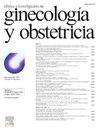从伦理角度讲,孕产妇晚期妊娠是否可以接受?
IF 0.1
Q4 OBSTETRICS & GYNECOLOGY
Clinica e Investigacion en Ginecologia y Obstetricia
Pub Date : 2024-10-14
DOI:10.1016/j.gine.2024.101003
引用次数: 0
摘要
本研究旨在阐明高龄产妇怀孕在伦理上是否可以接受,还是提倡在更年轻的年龄怀孕更好。具体目标包括评估与高龄产妇怀孕相关的医疗风险,并分析高龄产妇怀孕的伦理和社会影响。我们使用 PubMed 和 Web of Science 进行了系统性综述,关键词为妊娠结果、45 岁、50 岁、高龄产妇、绝经、伦理、生物伦理学。纳入了过去 10 年中以西班牙语或英语发表的研究。系统综述显示,45 岁或以上妊娠与年轻妊娠相比,会导致更多不良的母胎结局。因此,高龄产妇应接受适当的产前咨询和密切的产前监护。希望用自己的卵细胞受孕的高龄产妇应了解胚胎非整倍体的低成功率和高风险。建议对 43 岁以上、卵巢储备良好的女性进行胚胎植入前遗传学诊断,44-45 岁的患者体外受精周期应限制在三个以内。总之,高龄产妇怀孕越来越常见,而且患者和生殖医学及妇产科专家都认为这在伦理上是可以接受的。本文章由计算机程序翻译,如有差异,请以英文原文为准。
¿Es la gestación a edad materna muy avanzada éticamente aceptable?
In recent years, there has been an increase in the age at which women conceive and have children, especially in developed countries.
This study aims to elucidate whether pregnancy at a very advanced maternal age is ethically acceptable or if it is better to promote pregnancy at a younger age. The specific objectives include evaluating the medical risks associated with pregnancy at a very advanced maternal age and analyzing the ethical and social implications of pregnancies at advanced maternal ages.
A systematic review was conducted using PubMed and Web of Science with the keywords pregnancy outcome, 45 years, 50 years, very advanced maternal age, menopause, ethics, bioethics. Studies published in the last 10 years in Spanish or English were included. Reviews, meta-analyses, clinical cases, letters to the editor, comments, and opinion articles were excluded.
The systematic review revealed that pregnancy at age 45 or older is associated with more adverse maternal-fetal outcomes compared to younger ages. Thus, patients of very advanced maternal age should receive appropriate prenatal counseling and close prenatal monitoring. Women of very advanced age wishing to conceive with their own oocytes should be informed about the low probabilities of success and high risk of embryonic aneuploidies. Preimplantation genetic diagnosis is recommended for women over 43 years with good ovarian reserve, and in vitro fertilization cycles should be limited to three for patients aged 44-45 years. Patients aged 45-46 years should be informed about the minimal probability of success with autologous oocytes.
As a conclusion, pregnancy at a very advanced maternal age is increasingly common and is considered ethically acceptable by both patients and specialists in reproductive medicine and obstetrics and gynecology.
求助全文
通过发布文献求助,成功后即可免费获取论文全文。
去求助
来源期刊

Clinica e Investigacion en Ginecologia y Obstetricia
OBSTETRICS & GYNECOLOGY-
CiteScore
0.20
自引率
0.00%
发文量
54
期刊介绍:
Una excelente publicación para mantenerse al día en los temas de máximo interés de la ginecología de vanguardia. Resulta idónea tanto para el especialista en ginecología, como en obstetricia o en pediatría, y está presente en los más prestigiosos índices de referencia en medicina.
 求助内容:
求助内容: 应助结果提醒方式:
应助结果提醒方式:


